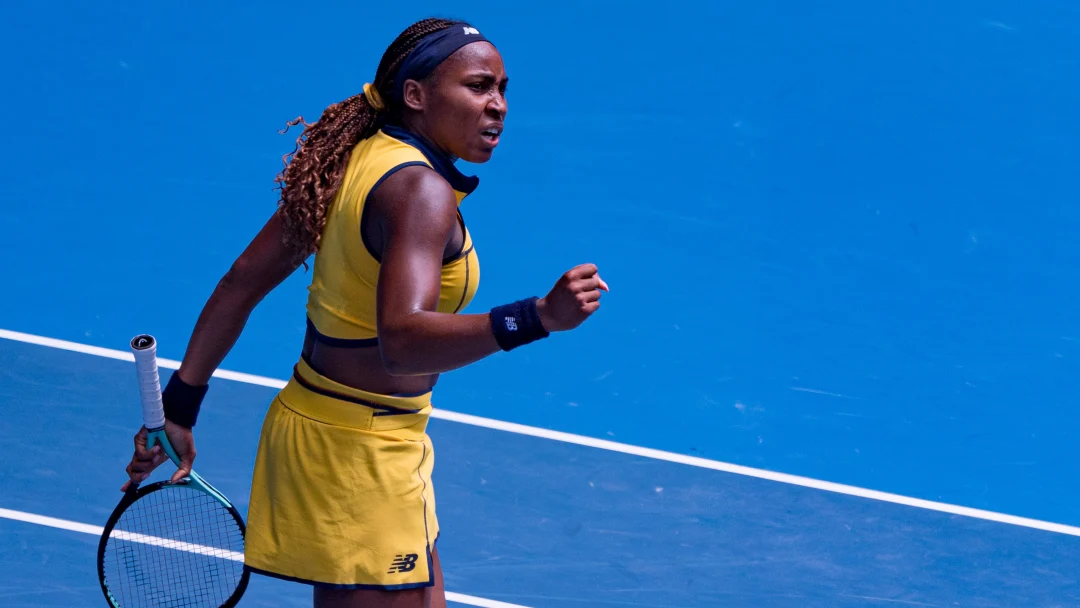
Coco Gauff is set to face off against Aryna Sabalenka in the highly anticipated semifinals of the 2024 Australian Open. This thrilling matchup has already generated much buzz, but it seems that some tennis commentators and analysts are questioning the nature of Gauff’s rise to the latter stages of yet another Grand Slam tournament.
This echoes similar criticism that Gauff faced during her remarkable run to the 2023 US Open title, where she ultimately bested Sabalenka in the final to claim her first Grand Slam trophy. While Gauff’s victory was celebrated by many, there were murmurs in some quarters that attributed her success more to her athleticism than her tennis prowess. Gauff, they claimed, did not dominate through superior skill, but rather through sheer physical endurance, outlasting her opponents rather than outplaying them.
This narrative has resurfaced at the Australian Open. Despite making it to the semifinals, where she will once again face Sabalenka, Gauff’s achievements are being scrutinized by some who continue to downplay her technical ability on the court. Former top-ten player Arnaud Clément is one such critic. After Gauff’s quarterfinal victory, Clément labeled her performance “extremely poor” in an interview with *Eurosport*. His remarks seemed to suggest that Gauff’s athleticism, not her tennis skill, was the primary factor propelling her deep into the tournament.
Clément’s comments have left many fans and analysts perplexed. To describe a player who has reached the semifinals of a Grand Slam as performing poorly seems, at best, hyperbolic. While it’s true that athletes can win matches without playing their absolute best, the notion that Gauff’s success is due to luck or athleticism alone feels like an oversimplification. Coco Gauff is a lot more than just a fast and agile athlete on the court; she is a highly skilled tennis player who has proven herself capable of beating the best in the world.
Gauff’s path to the semifinals has not been easy, and while she may not have played flawless tennis in every match, she has shown tremendous mental resilience and tactical intelligence. Tennis, after all, is about far more than hitting perfect shots every time. It’s about reading your opponent, adjusting your game plan, and managing your emotions under pressure. Gauff has demonstrated all of these skills repeatedly throughout her young career. To reduce her game to mere athleticism misses the essence of what makes her so dangerous on the court.
This line of criticism is, unfortunately, not new. Gauff has often had to contend with the perception that her success is due more to her physical gifts than her tennis abilities. Some commentators have implied that Gauff, as a young African-American woman, is more of an “athlete” than a “player,” a line of thinking that many find troubling. It’s a subtle form of undermining her achievements, as if to suggest that she doesn’t possess the same tennis IQ or technical precision as some of her peers. Yet, this argument collapses under scrutiny. Gauff’s tactical decision-making, mental fortitude, and ability to make adjustments in real-time have all been on full display throughout her career.
Yes, Coco Gauff is a superb athlete—her ability to cover the court with speed and precision is part of what makes her so tough to beat. But to focus solely on her athleticism is to overlook her skillful shot-making, strategic play, and calm under pressure. These are the traits that have allowed her to outlast and outplay top-tier opponents, including Aryna Sabalenka, whom she has beaten four times in their previous six meetings.
Ahead of their semifinal clash at the Australian Open, Gauff leads their head-to-head rivalry 4-2, a testament to the fact that she is more than capable of holding her own against one of the most powerful and aggressive players in the women’s game. Sabalenka, the current world No. 2 and reigning Australian Open champion, has been in formidable form, bulldozing her way to the semifinals without dropping a set. Her powerful serve and aggressive baseline game make her a tough opponent for anyone, but Gauff has shown she knows how to neutralize that power with her defensive prowess and ability to turn defense into offense quickly.
Clément’s comments about Gauff’s performance being “extremely poor” in her quarterfinal win seem particularly harsh, especially when considering the caliber of opposition she has faced. Reaching the semifinals of a Grand Slam is no small feat, and it speaks volumes about Gauff’s consistency, focus, and determination. Even when not at her very best, she has found ways to win—something only the elite in tennis can do. If anything, Gauff’s ability to win matches when she isn’t playing perfectly should be seen as a strength, not a weakness.
As Gauff prepares to face Sabalenka once again, this time in Melbourne, tennis fans are in for a treat. Both players have been in excellent form and are capable of producing breathtaking tennis. The semifinal promises to be a thrilling contest between two of the game’s rising stars, each with their own unique strengths. For Gauff, it’s another opportunity to prove that she belongs among the sport’s elite, not just as an athlete, but as a fully-fledged tennis player with the skill, strategy, and composure to win on the biggest stages.
Regardless of the outcome, one thing is clear: Coco Gauff is much more than a great athlete. She is an exceptional tennis player, and those who continue to underestimate her technical abilities do so at their own peril.
Leave a Reply